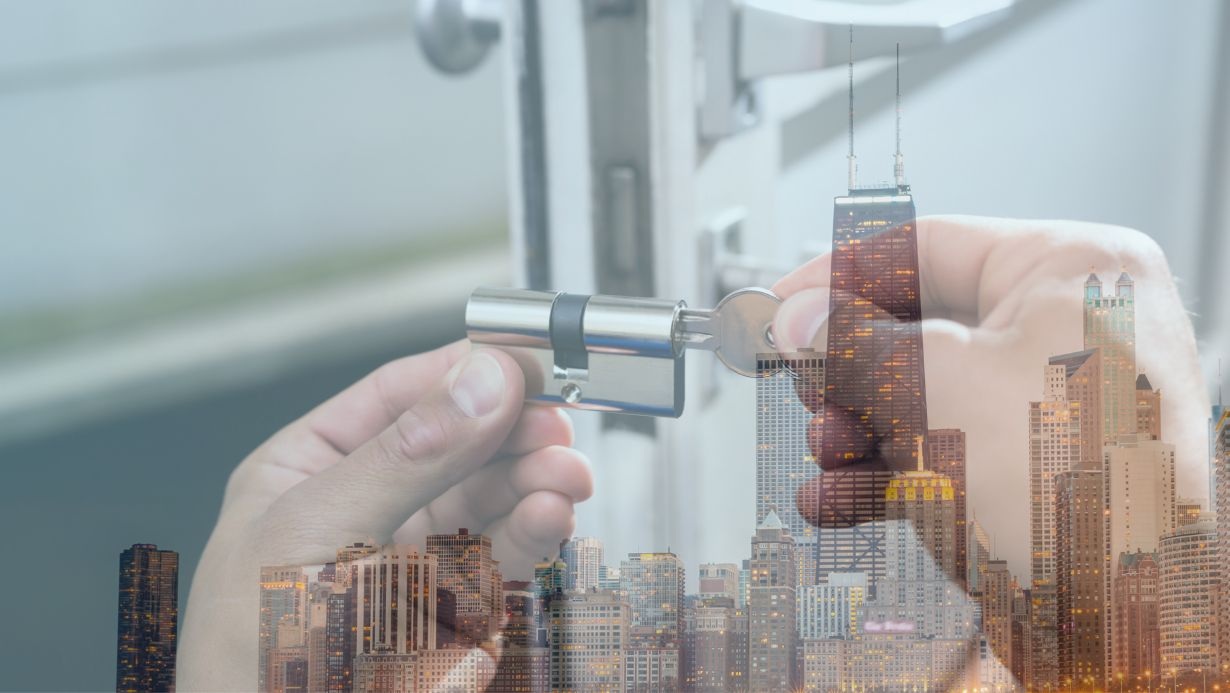As a landlord in Chicago or the Chicago suburbs, understanding your tenants' legal rights regarding changing locks in rental units is crucial for maintaining property security and ensuring compliance with local housing regulations as well as state and local laws. This guide aims to clarify when and how tenants can legally replace locks and what you, as the landlord, can do in response, ensuring you are fully prepared to manage such situations effectively.
Can a Tenant Change the Locks Without Landlord's Permission
Lease Agreement Specifications:
The ability of a tenant to change the locks of their Chicago rental property fundamentally depends on the terms outlined in most tenant agreements or with permission. If the lease explicitly permits tenants to change the locks, they are legally allowed to do so. It’s essential to review your lease documents to understand the provisions you have set regarding lock changes. Changing locks without the landlord's permission can be a breach of the tenancy agreement. The tenancy agreement is crucial in outlining the responsibilities and rights of both landlords and tenants.
Provision of Keys:
Chicago law generally supports the idea that tenants should provide landlords with a copy of the key to any newly changed door locks. This requirement is to ensure that landlords retain access to the unit for inspections, emergencies, or necessary repairs, aligning with the obligations outlined under the Chicago Residential Landlord and Tenant Ordinance (RLTO).

Lease Agreement Requirements
When it comes to changing locks on a rental property, the tenant agreement provided by the landlord or Chicago property management company plays a crucial role in determining the rules and regulations surrounding this issue. Most lease agreements require tenants to obtain the landlord’s or property management company's permission before making any changes to the property, including changing the locks. However, some agreements may be more lenient and allow tenants to change the locks without permission, as long as they provide the landlord with a spare key.
It’s essential for tenants to review their agreement carefully to understand their obligations and responsibilities regarding lock changes. If the lease agreement is unclear or ambiguous, tenants should consult with their landlord or property manager to clarify the rules and regulations.
In general, lease agreements may require tenants to:
Obtain permission before changing the locks
Provide the landlord with a spare key
Use a lock that meets the landlord’s specifications
Notify the landlord of any changes to the locks
Tenants who fail to comply with the lease agreement requirements may face penalties, fines, or even eviction. Ensuring clarity in the lease agreement can prevent misunderstandings and foster a cooperative relationship between landlords and tenants.
Actions for Landlords When Tenants Change Locks Without Permission
Communication and Request for Keys:
If a tenant changes the locks without your permission and the lease does not allow for such changes, the first recommended step is to communicate with the tenant. Unauthorized lock changes can lead to security risks. Politely request a copy of the new key, citing the lease agreement and local laws that require landlord access.
Locksmith Intervention:
If a tenant refuses to provide a key and immediate access is needed (e.g., emergency maintenance), you may have the legal ground to call a locksmith to gain entry. A lock change may be necessary to maintain security and control over the property. However, this action should be considered carefully and typically as a last resort, ensuring it is justified and necessary.

Security Concerns and Lock Changes
Security concerns are a common reason why tenants may want to change the locks on their rental property. If a tenant feels that their safety is at risk due to a security breach or a lost key, they may want to change the locks to ensure their security and peace of mind.
However, tenants should always consult with their landlord or property manager before making any changes to the locks. This is because the landlord may have specific requirements or regulations regarding lock changes, and tenants may need to obtain permission before making any changes.
Some common security concerns that may lead to lock changes include:
Lost or stolen keys
Break-ins or attempted break-ins
Harassment or stalking
Domestic violence
In such cases, tenants may want to consider changing the locks to ensure their safety and security. However, they should always follow the proper procedures and obtain the necessary permissions before making any changes. Addressing security concerns promptly and transparently can help maintain a safe living environment and a positive landlord-tenant relationship.
Cost of Changing Locks
The cost of changing locks on a rental property can vary depending on the type of lock, the complexity of the job, and the location of the property. On average, the cost of changing locks can range from $50 to $200, depending on the type of lock and the services required.
Tenants who change the locks without the landlord’s permission may be responsible for paying the costs of changing the locks. However, if the landlord is responsible for maintaining the locks, they may be required to pay the costs of changing the locks.
Some common costs associated with changing locks include:
Lock replacement: $50 to $100
Lock installation: $50 to $100
Key duplication: $10 to $20
Lock repair: $20 to $50
Tenants should always consult with their landlord or property manager to determine who is responsible for paying the costs of changing the locks. Clear communication and understanding of financial responsibilities can prevent disputes and ensure that the rental property remains secure and well-maintained.

Landlord Rights to Drill or Switch Locks
Post-Tenancy:
As Chicago rental managers or landlords, you are required to change the locks once there is tenant turnover. Property ownership rights allow landlords to switch out locks to ensure security for new tenants. This measure ensures the security and privacy of new tenants moving into the property.
Unauthorized Tenant Actions:
If a tenant decides to change the locks without adherence to the lease terms or without providing you a new key, tenant change of locks without permission can lead to legal actions. You may also change the locks back to maintain security and control over the property, provided that you notify the tenant and follow legal procedures for such actions. Be sure to understand what is considered a Tenant Lockout in Chicago! Blocking entrances, changing locks, removing or disabling appliances, removing doors etc. can lead to serious legal implications if you do not follow this correctly.
Considerations and Best Practices
Lease Clarity:
To avoid conflicts and misunderstandings, ensure your lease agreements clearly state the policies regarding lock changes. Changing locks vary by state and local laws, and it's important to specify these in the lease agreement. Specify whether tenants are allowed to remove and replace locks, under what circumstances, and the protocol for providing keys to the landlord.
Security and Compliance:
Always consider the security implications of tenants changing locks and ensure that any actions taken comply with local regulations. Keeping good communication with tenants can also help prevent unauthorized changes and foster a cooperative relationship. Clear communication about lock changes is crucial for maintaining the security of the unit. Changing locks without the landlord's permission can lead to legal consequences.
Documentation and Records:
Keep detailed records of all communications and actions related to lock changes. This documentation can be crucial in case of disputes or legal proceedings.
Conclusion
As a landlord or rental company in Chicago, it's important to understand both your rights and the rights of your tenants regarding changing locks. By ensuring your lease agreements are clear and in compliance with local laws, and by maintaining open lines of communication with your tenants, you can manage your property effectively while upholding the safety and security of your rental units.
If you want to talk more about this or have questions about managing your property within the framework of Chicago's housing laws, consider reaching out to a professional property management company like Landmark Property Management. Our expertise in local rental property management can help guide you through the complexities of property management in Chicago and the surrounding suburbs. Contact us today! Visit our website at Chicagospropertymanagement.com to learn more about our services and how we can assist you in navigating these and other property management challenges.






.png)


